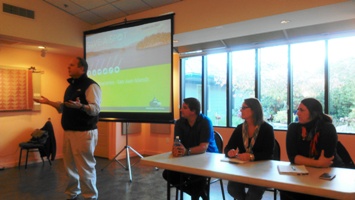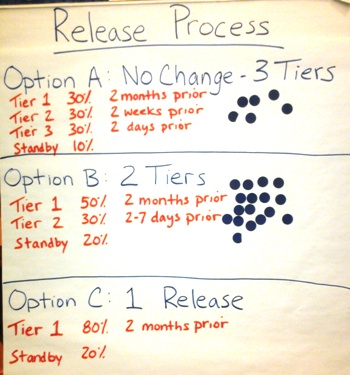— by Margie Doyle —
Washington State Ferries staff recently conducted a series of meetings on Lopez, Orcas, San Juan and Shaw Islands regarding the effectiveness and the challenges of the Anacortes-San Juans reservation system, which began in January, 2015.

Rick Hughes, at left, greets those who attended the Orcas Ferry Reservations meeting on Oct. 15. Seated at the table, left to right are WSF’s Trevor Sharp, Teri Haffie, and Kristina Arsenault
At the Orcas Island meeting on Thursday, Oct. 15, County Councilman Rick Hughes introduced the WSF staff, several of them new to the WSF reservation system:
- Brian Churchwell, Reservation Program Manager
- Susan Harris-Huenther, Call center and Service Manager
- Trevor Sharp, WSF staff for terminal operations in Anacortes;
- Teri Haffie, who oversees contract agents, for Orcas Lopez, Friday Harbor and Shaw, including the budget; a 35-year employee for WSF in Seattle, lives in Bremerton
- Kristina Arsenault, Communications and Outreach Manager
Brian Churchwell recapped the rationale for a reservation system on the Anacortes-San Juans route. In 2009 the State Legislature directed the State Dept. of Transportation’s state ferry system to plan for growth and make better use of limited resources, including scheduling considerations, and, says Churchwell, “the obvious outcome was vehicle reservations.”
Churchwell presented the analysis of the data from the past nine months since the San Juans reservation system started to improve the system.(To see the presentation, go to wsdot.wa.gov/SJIReservationsFall2015Outreach.pdf
The purposes of the outreach meetings, Churchwell said, were to:
1) review ridership and reservation data
2) gather and review feedback
3) identify program modifications based on feedback
Charts were set up to register audience preferences in three areas:
1. Modifications of No Show Fees
- Maintain current $10 no show fees
- Increase no show feel by 50%
- Charge full-fare ($22.40 -31.90)
2. Modifications of Cancelation Policy
- Maintain current policy
- Allow incentive of reduced future fare if cancellation is made 2 days prior by midnight
3. Modification to Reservation Release Times
- Option A:maintain 3-tier schedule with 30% of tickets released two months in advance; 30% released two weeks in advance; 30% released two days in advance and 10% reserved for stand-by vehicles;
- Option B: two tiered release
1st tier: at beginning of season — 50%
2nd tier: 2-7 days prior to sailing — 30%
Standby 20% at time of staging - Option C
releases 2 months in advance –80%
Reserve standby — 20%
Churchwell said that WSF’s analysis showed that ferry ridership increased 3.2 % overall for this route, including 5.2% increase of passengers and .9% increase in vehicles. He also noted that with the Tacoma and the Elwha being out of service this summer, levels of service were impacted.
After mentioning the benefits of predictability and reduced time waiting at terminals, he acknowledged that there is a downside for ferry landing retail businesses.
He also said the reservations system reduces queueing at terminals and reduced overloads while maintaining ridership (excluding the vessel capacity reduction this spring and summer).
Among the challenges presented by the reservation system is the tiered release of reservation spaces. WSF is experiencing a 95% increase in calls, and the 7 a.m. space release times create surges on online/phone users that is difficult to manage. In addition, phone users are at a “disadvantage due to second and third tiers being taken within five minutes by online users.”
Another challenge is the website usability, including on mobile devices.
The reported 10% no-show rate impacts the ability to communicate available space for drive-up/standby vehicles; and seven percent of reservations don’t travel at all: some are “insurance” reservations to those for whom the ’$10 “no show” fee is not a lot of money
Following the slide-show presentation of findings of the past nine months’ reservation system, many in the audience brought up their concerns about medical-related travel
WSF conducted a mail survey in San Juan County Survey with nearly 10,000 postcards sent out. The response rate was 2.5%, composed of 91% fulltime residents. Of those, 56% are satisfied with the reservation program. Respondents requested modifications to improve standby space and reduce toll booth wait.
Kristina Arsenault asked for audience feedback and encouraged all to fill out the comment form or communicate with WSF while it is considering modifications.
One man stated, “My [lodging] business had more cancelations than ever in 1the 8 years of operations, due to lack of confidence in making reservations. They required more lead time than we do.” He advocated increasing the number of reservations that can be made two months — or more — in advance. “In our opinion that would bring the greatest relief in traveler stress.”
Another questioner expressed multiple frustrations to the website and suggested improvements. WSF representatives said it is “working with a third party in Olympia to fix the website.” Another person suggested a computer application to see what space is available on sailings.
After several stories of disruption of service due to ferries not sailing, Kristina said that the lack of service was “inexcusable” and promised to look into the cases. Churchwell said, “If the service disruption is on us, all fees are waived.”
The priorities of medical and disable travelers were discussed, with one woman thanking WSF for the predictability of the reservation system and for the willingness of WSF reservation personnel to help her make multiple reservations. “I couldn’t have done what I did this summer [without the reservation system]. The relief of stress was considerable, I really appreciate it.”
Sometimes the medical appointments on the mainland can run late, so that people miss their return reservations. Others pointed out the times when the ferry workers loading the vehicles don’t get communication from the ticket booths and asked how much of the 10% standby spaces were taken up by medical emergencies.
People complained of having to give up their reservation if they arrive at the terminal in time for an earlier sailing. Churchwell said the statistics show that 2% of customers attempt to travel on an earlier sailing that the one they reserved. This increases time at the tollbooth to explain policies
and customers unhappy about forfeiting guaranteed space on reserved sailing, he said. Then ferries may depart with available space, and riders who don’t want to take risk of traveling standby having to wait 3-4 hours
Arsenault said that there will soon be a new training program to facilitate understanding of the reservations system, both within WSF staff and to the public.
Many asked for more flexibility in cancelations than the current policy which requires cancelation by 5 p.m. the previous day.
Several related that their experience has been better when they call to change their reservation time, instead of canceling three hours prior to the sailing and incurring a cancelation charge.
WSF plans to implement changes to the reservation system as needed in the spring/summer of 2016, Churchwell said.
**If you are reading theOrcasonian for free, thank your fellow islanders. If you would like to support theOrcasonian CLICK HERE to set your modestly-priced, voluntary subscription. Otherwise, no worries; we’re happy to share with you.**







